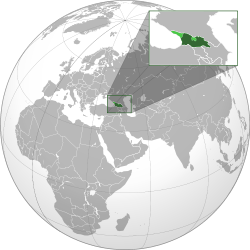Georgia: NATO Chief ‘Extremely Concerned Over Arrests Of Political Opponents’
By Civil.Ge
(Civil.Ge) — NATO Secretary General, Anders Fogh Rasmussen, said on November 12 that he was “extremely concerned” over recent arrests of “political opponents” of new government in Georgia.
Former defense and interior minister Bacho Akhalaia, as well as chief of army staff Brig. Gen. Giorgi Kalandadze and former commander of 4th army brigade Zurab Shamatava were arrested and charged with abuse of soldiers. Kalandadze and Shamatava were released on bail and Akhalaia, who also faces other charges too involving illegal confinement, was remanded in pre-trial custody pending investigation. Brig. Gen. Kalandadze was suspended from office through court’s ruling.

President Saakashvili’s United National Movement (UNM) condemned the arrests as launch of “political retributions” by the new authorities against the representatives of previous administration. But the new authorities say that the arrests were part of a campaign of “restoring justice” by investigating alleged wrongdoings by former senior officials.
Speaking at a meeting of the NATO Parliamentary Assembly in Prague on November 12, NATO Secretary General, Anders Fogh Rasmussen, said, after he was asked about Georgia, that he appreciated the way October 1 parliamentary elections were conducted and added that Georgia passed “a litmus test when it comes to democratic development.”
He said that he also appreciated the way how transfer of power took place following the elections. “So far so good,” he said.
But Rasmussen also added: “No reason to hide that I’m extremely concerned about the development we have seen since then [the elections and transfer of government], not least related to recent arrests of political opponents in Georgia.”
“Well, I am not going to interfere with judicial system in Georgia. It’s for the legal system, the judicial system in Georgia to sort out these cases. But of course it’s important that such trials are not undermined by political interference,” he said and added that NATO would follow developments “very closely.”
Georgia’s PM Bidzina Ivanishvili, who is now visiting Brussels, plans to meet NATO Secretary General on November 14, according to the Georgian Foreign Ministry.
Meanwhile, President of European Commission José Manuel Barroso, who met PM Ivanishvili on November 12, called on Georgia’s new government, without mentioning any specific case, to avoid “situations of selective justice.”
Also on November 12, the NATO Parliamentary Assembly passed a resolution on “the Future of Democracy in the Eastern Neighbourhood” part of which also addresses Georgia. Echoing allegations of President Saakashvili’s United National Movement Party, the resolution expresses concern over “the reported pressure on local self-government institutions and particularly the Georgian Public Broadcaster and calls upon the new government of Georgia to refrain from politically motivated arrests.”
The non-binding resolution also calls on the NATO-member states to consider granting Georgia a Membership Action Plan (MAP) “in order to ensure more comprehensive scrutiny over its political and institutional reforms.”
President Saakashvili, who was in Prague where he attended the NATO Parliamentary Assembly and met with the NATO Secretary General, said on November 12 that the recent arrests, especially the one of the army chief of staff, harmed Georgia’s NATO integration process and “thwarted” NATO Military Committee’s visit to Georgia.
“It is of course very unfortunate that the Secretary General was very critical. I actually do not remember NATO having a critical tone about Georgia in recent years and I can barely recall NATO having such a critical tone towards any country,” Saakashvili said in televised remarks.
He said that he did not think the new government carried out these arrests “intentionally” to harm Georgia’s NATO integration, but was rather a result of the new authorities’ “inexperience”.
“If only they had waited for at least few weeks… I really can’t understand why these hasty decisions were needed,” Saakashvili said.
Saakashvili said that the way how elections were conducted with consequent power transfer, created an opportunity for Georgia for making “a big leap forward” in terms of NATO integration. He said that despite of recent developments NATO should anyway give Georgia “at least some positive signals” in terms of integration process when NATO foreign ministers meet in December.
“My message to the Secretary General was that [recent developments] should not in any way stop Georgia’s progress towards NATO. Governments and presidents will come and go in Georgia, but we should definitely join NATO,” Saakashvili said.
“Despite of these developments, NATO-Georgia Commission meeting at the level of foreign ministers should any way be held and there should be some kind of progress; the NATO Military Committee should definitely visit [Georgia] at some point. Yes there will be questions asked, but the Georgian people’s [interests] should not be harmed because of someone’s inexperience or because of anyone’s some other intentions,” he said.
Saakashvili also said that by meeting with former chief of staff Kalandadze in the presidential palace after his release on bail and by instructing him to continue performing his duties, he wanted to send a message to the new government about the need “to put this incident aside.”
“But unfortunately they did not use this chance,” Saakashvili said.
After this meeting between Saakashvili and Kalandadze on November 10, chief prosecutor’s office filed a motion to the court requesting suspending Kalandadze from the office on which the Tbilisi City Court ruled positively next day.
“I think that we should all understand this [NATO integration] should not be an issue for wrangling between the President and the government; this is vitally important for Georgia to be part of this Alliance. It should not be a matter of political confrontation,” Saakashvili said.
Saakashvili also said that he welcomed that PM Ivanishvili was now visiting Brussels and added that such visits would help the new government in gaining more experience.
“I think these [visits] will give him [PM Ivanishvili] more information on many issues and will be useful for him and it will help each member of this government to see Georgia’s interest more clearly,” Saakashvili said.
